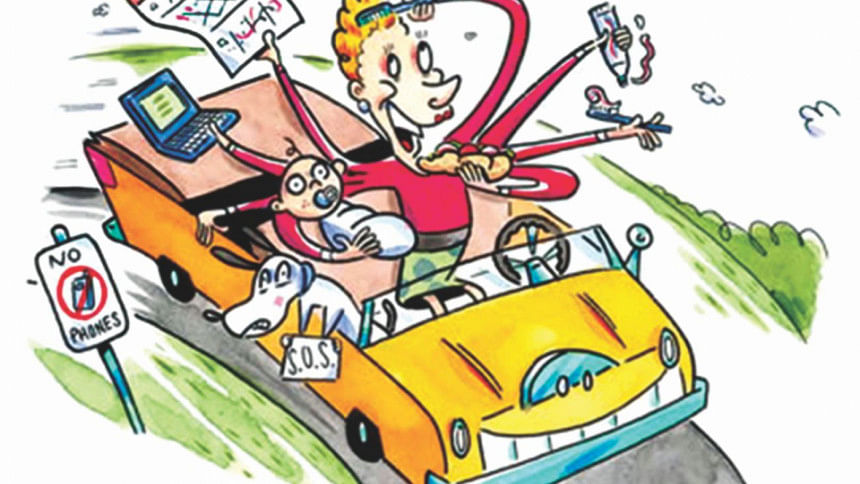Whither professionalism

It happens occasionally, during busy hours particularly, that even before you can get off the rickshaw, mama has begun negotiating with his next customer, about which you cannot complain much because you have already completed your journey as per contract and the rickshaw-puller has the right to earn his bread. As the payment exchanges hands, a subtle tension develops and the feeling on both sides, three actually, is that you should get off because the more important customer is now in waiting. The outgoing passenger (you) and the incoming commuter often get to brush certain parts of their bodies, depending on the busy traffic that has occupied the other possible side of alighting, perhaps not realising that never the twain shall meet again.
At a deshi restaurant, curiously called 'hotel', not the imported sushi or grill, balti or hot plate genre, the waiter definitely has more than four hands. He hands you the gravy-stained menu card while holding three filled glasses on his left, on the way wiping the remnants of the previous customer's satisfactory meal and casually slipping a bill to the patron seated down the slippery aisle.
The shop counter that tops up or refills phone cards was empty when you requested the clerk to transfer your cash to another mobile number. While he is doing what you think is an important task because you do not want your money to land up in an undesired destination, another person butts in, asking if the gentleman could add Tk. 50 to his phone account. In the next 20 seconds, two more customers approach my money-transfer man with a similar request but of different denominations. Suddenly, out of nowhere, a lady asks at the top of her voice if the shop has a push shower. For the first time I looked up to see that actually it does, in addition to electric kettles, table fans, wiring of various dimensions, sockets and plugs… I am now surrounded by five people and, would you believe it, all of us are in a state of comfort because we have been made to believe that all of us are being served.
The MRI room of a reputed diagnostic lab is filled with patients and their attendants, online technicians and service personnel. The door of the CR scan room opens to reveal a large bed at the head of a large spherical machine. A patient lies down in full view of others, not concerned. The online technician in the meantime gets a call on his mobile. During much of the ten to fifteen minutes, the man inside is undergoing the scan, the technician is talking full throat regarding some house rental issue, his right hand on a mouse to move the cursor over what is on the screen, and his other eye hopefully on the patient. Continuing the phone call, the technician concludes the scan and announces loudly, 'the patient will now get down'. To no one's amazement, a service person indeed leaves some other pursuit at another part of the room, and moves in to help the patient off the flatbed.
Once, while travelling in an air-conditioned bus from Chittagong to Dhaka, I found the driver of the top-of-the-line paribahan talking throughout the journey on his phone. Thank God, he had two hands, because while one held the cell phone, the other was on the steering wheel. Another time, I saw the driver of a bus adeptly open the cap of a sealed mineral water bottle with his left hand while his right hand was on the wheel. Phew! Long-haul drivers of AC passenger buses are, according to my information, rather well paid. They work with an air of disdain, for the job at hand is routine (it has become boring) and they have not met with an accident, yet. Realise they not, lessons of the past they do not take: not all live to tell the tale.
Multitasking is common in this country. In most cases, the dealing of several people at the same time is not life threatening; at worst, it is impolite, perhaps considered an inherent attribute of our social custom. Yes, yes! We have many rich traditions, but simultaneously encountering as many people as the number of our body parts cannot be accepted in all situations, because there are serious risks involved.
Stretching the same demeanour to tasks where human life is involved can lead to catastrophes. A medical treatment could go wrong, a vehicle could end up in a ditch off a highway, a critical part of a building could be inadequately constructed, a lot of money could be hacked… Either we are extremely talented, despite our qualifications, unmatched by any other species in the world, or we are insensitive to the job we are undertaking, unaware of the risks involved, aided by our general indifference. The problem in developed countries is that they cannot find reasons to be positive and have to undergo stress sessions, pep talks, etc. Our problem is we are always 'damn-caringly' positive. Nothing can go wrong, because "I" am doing it, and, please, "I" know what "I" am doing. That is our attitude whether we are selling sugarcane juice off the roadside drain or piloting a trainload of passengers across the Bangabandhu Bridge over the Jamuna.
Professionalism is essential in all walks of life. Any one task should be completed before taking up another; that adds to efficiency. Let us learn to deliver what is expected of us competently, without allowing our F&Fs or any other interference to be a cause of distraction. After all, we are paid for the job that we are supposed to perform. Low pay? That's another agenda, and cannot be the justification of your under-performance.
The writer is a practising Architect at BashaBari Ltd., a Commonwealth Scholar and a Fellow, a Baden-Powell Fellow Scout Leader, and a Major Donor Rotarian.

 For all latest news, follow The Daily Star's Google News channel.
For all latest news, follow The Daily Star's Google News channel. 



Comments